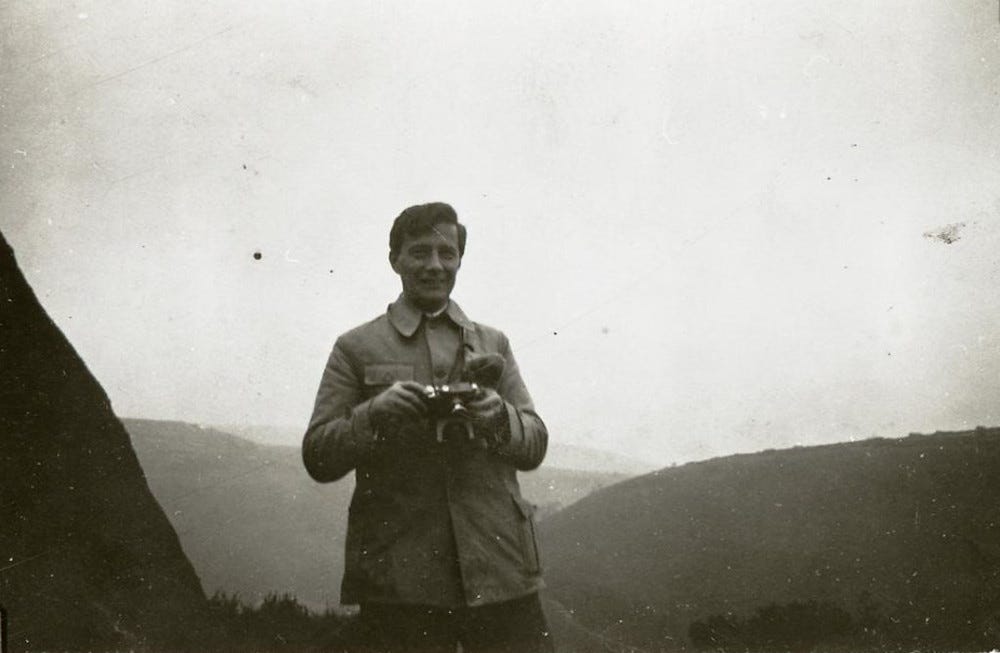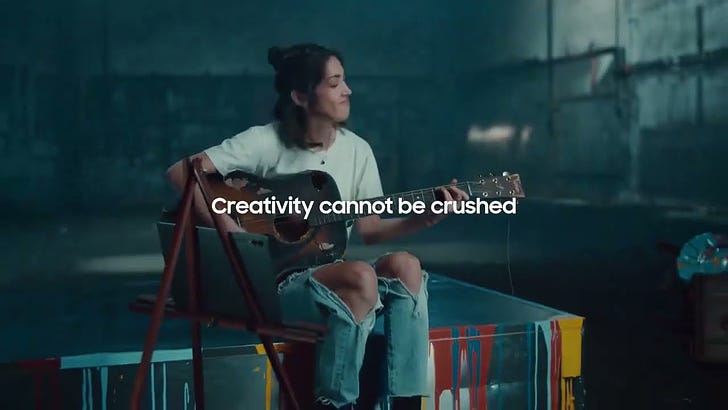Apple left its fingers in the press
Some thoughts on thin tablets, a reprise of villainous things, and the weirdly hazy boundaries between things and us.
I grab the handle of a two-wheeled cart and, with a finger on my other hand, poke a smartphone app to listen to the radio. I listen as I drag the cart around to distribute hay and check watering troughs. One nice thing about modern hearing aids: they serve as pretty nice earbuds, too, but they’re unfortunately pricier even than the Apple ones. I’m listening to The World, a weekday news program that covers “American issues and events through the eyes of foreign observers, and contextualizing foreign affairs for American listeners.”
The week that Apple stumbled over itself with its Hydraulic Press Wantonly Destroys Things ad The World featured a brief interview with Dr. Iza Kavedžija, a University of Cambridge professor of social anthropology. She was interested in the response among Japanese viewers of the ad.
In case you haven’t seen it: Apple, Crush! - iPad Pro. YouTube video, 2024.
Kavedžija focused on care and respect—qualities that utterly lack in the ad—and considered them as determinants of how Japanese viewers interpreted the ad. Kavedžija said that as she watched the ad,
this Japanese phrase taisetsu nisura (大切にする) came to mind. Taisetsu nisura means “to protect, to cherish, to look after, to value.” And it can be used in reference to human and non-human others—to objects—and it really conveys the sentiment, a sense of respect for others, for human, non-human others, and particularly fruits of other people’s labor that involve skill in making such as instruments which have been crafted with care. So I think perhaps one of the feelings involved here is this kind of absence of care and treating things with respect—and others by extension, really [1:58].
As I dropped hay in Jack’s and Monty’s pasture, I thought of old discarded tools ignominiously sprawled in medieval Japanese alleys and angrily complaining, “Instead of getting the reward that is our due, we are abandoned in the alleys to be kicked by oxen and horses. Insult has been added to injury, and this is the greatest insult of all! Whatever it takes, we should become specters and exact vengeance.”
I thought of the tools’ revenge as they turned into tsukumogami, “specters” who exact revenge against their heedless former human keepers.
In Case You Missed It: Some 99-year-old tools might scare you. Fantastical creatures I ran into while reading for a chapter I'm writing. And children working with tools.
Crush and UnCrush. Why it hurt so bad
After completing chores, my mind still stuck on the video and the short piece on The World. The little folklore villains and the special place of tools in our lives pressed on me a bit.
The “absence of care and treating things with respect” amounts to throwing old tools and utensils into dark medieval alleys. But I think the fact that response to the ad worldwide was so generally negative points to a wider sensibility about how to treat things and, as Kavedžija said, “others by extension, really.”
The ad might also have offended a deeper quirk of human consciousness.
Part of the Japanese folk story of the tsukumogami reflects the complex relationships that human beings have with their tools, a relationship that deepens as time goes on. It’s no wonder that the folk tale focuses on very old things.1 Humans have held them and cared for them for a long time.2

The relationship binds humans with things, too, in ways that are ineffable and mysterious.
Michael Polanyi, a scientist-philosopher often called a polymath, became known in part for his concept of “tacit knowledge,” a deep understanding of the world that arises from lived experience and practices. It’s not a knowledge that is easily translated into writings or formal instruction. Polanyi pointed out the complexity of human experience with common tools, and linked that to an expansive view of consciousness and human existence.
“The way we use a hammer or a blind man uses his stick shows in fact that in both cases we shift outwards the points at which we make contact with the things that we observe as objects outside ourselves,” he wrote in a rather contorted way in Personal Knowledge. After that unfortunate but useful sentence, he wrote: “While we rely on a tool or a probe, these are not handled as external objects. . . . We pour ourselves out into them and assimilate them as parts of our own existence. We accept them existentially by dwelling in them” (emphasis added).
If human use of tools so profoundly ignores “obvious” physical boundaries of things and human beings, the folk tale of resentful discarded old tools would reveal doubled wounds: a disregard and disrespect of old things and a loss to humans of “parts of our existence” lent us by our tools.
And that loss is in part—maybe even a large part—why “Crush!” pushed Apple to apologize.
The double offense made Apple’s thoughtless “Crush!” painful for many worldwide—and, more specifically, to the many “creatives” who make up the iPad’s targeted market, most of whom already view their regular old tools as part of their existence.
Because the tablet market is competitive, Apple’s rival Samsung responded to “Crush!” with “UnCrush”:
The Samsung tablet has a supporting role beside a woman who plays a damaged but still working guitar. Note her knees. Her jeans are ripped, well loved, and comfortable, no doubt. The old thing prevails; wreckage isn’t the end, after all.
A thinly pressed tablet isn’t a replacement for the things that have become well loved parts of who we are.
In some ways, Apple’s misreading of their role as makers of tools cast creative “users” into the alleys, too. And in response, the “users” became a kind of spectral market, consumer tsukumogami of sorts. They rose up and exacted revenge and drew out a flabbergasted apology from Apple.
What did you think about the Apple ad? And what does Reza Sixo Safai’s reversed version convey? Got a comment?
Tags: Apple, Samsung, tablet, computer, tool, utensil, instrument, music, art human, robot, techbro, bonehead, tsukumogami, Japan
Links, cited and not, some just interesting
It’s short—about four minutes. It got me thinking. The World is a pretty good news broadcast, and it’s frequently available from your public radio station. “New iPad Ad Is Shameful, Say Some Viewers.” The World from PRX, May 10, 2024. https://theworld.org/segments/2024/05/10/new-ipad-ad-is-shameful-say-some-viewers.
Polanyi, Michael. Personal Knowledge: Towards a Post-Critical Philosophy. Chicago: Univ. of Chicago Press, 2009.
I pushed this link out in the last post, but it fits here better: Reza Sixo Safai, I Fixed Apple’s Ad / 2 Mil Views on X. YouTube video, 2024.
A perceptive take on the Apple ad: Hurst, Mark. “Apple Made a Terrible Mistake: It Told the Truth.” Creative Good, May 10, 2024. https://creativegood.com/blog/24/apple-tells-the-truth.html.
The Japanese phrase for very old also translates to ninety-nine years, so the age of the tools in the folk tale is more evocative and figural than numerically accurate.
Even today, some Japanese families honor this relationship by recognizing the “service” of toys and tools. Old unwanted dolls, screens, or musical instruments—especially traditional ones or things that have been passed through generations—are given funerals and are “respectfully disposed” in temple ceremonies. See Greene, Heather. “Japanese Temples Are Holding Funerals For Unwanted Dolls.” Religion Unplugged, November 5, 2021. https://religionunplugged.com/news/2021/11/5/japanese-temples-are-holding-funerals-for-unwanted-dolls.





My immediate thought was that, in a time where prices of goods soar and diverge from salaries, people see needless waste flaunted by a company known for creating devices that constantly beg to be updated on a two-year cycle. (As I type on an iPhone near end of contract that predictably holds a charge similar to a baking potato.) But - and also predictably - you took it in a far more eloquent and thoughtful exploration of tools as extensions of ourselves.
(And I would be tempted if I were a prof to get “unfortunate but useful sentence” put on a rubber stamp for ease of future marking. 😅)